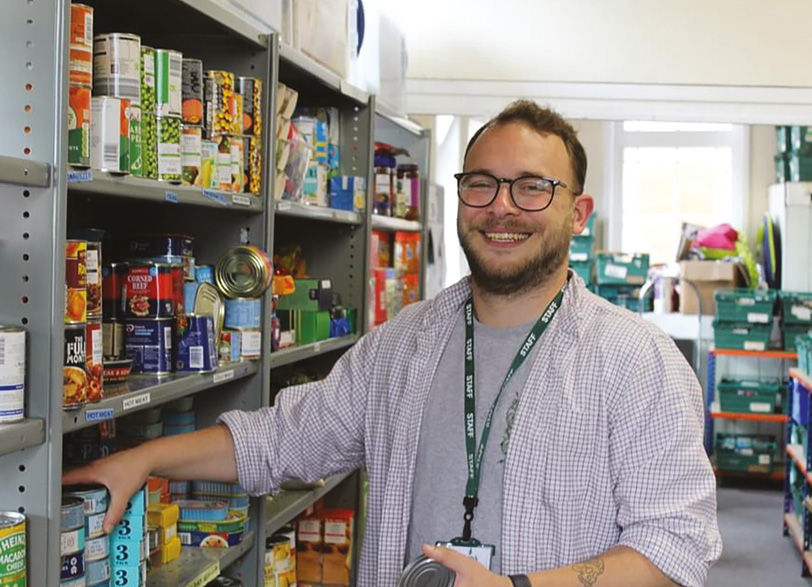Foodbanks - who uses them and why?
- Faversham Eye
- Nov 18, 2024
- 3 min read
By Dominic Deeson

Five years’ ago, Jane (not her real name) started a relationship wIth a man who she believed would be a loving and caring partner. He seemed genuinely interested in her three children and wanted them to be a family.
“Once we started living together, he took control. He was very strict with the kids and told them they could only see friends he ‘approved of’.
“If I wanted to go out, I had to tell him exactly who I was seeing and where I was going. I had to be home no later than the time he decided,” Jane recalls.
“He took the money I earned, leaving me with £50 a week to buy the food to feed the five of us - and he was furious when I couldn’t do it.”
Jane and the children left their London home a few days after her partner called her eldest daughter a “dirty slag” because she had started her periods.
“Why did I come to Faversham? Because I didn’t know anyone here. I am anonymous and that means he can’t find me or the children,” Jane says.
“Now, I am free but I have nothing but debts. Someone helped me with a plan to pay them off, but it leaves me with very little money for food, paying the electric and stuff that I need for the kids.”
Citizens Advice Swale gave Jane a foodbank voucher and explained that the volunteers based at the foodbank in Tanners Street would give her enough emergency food to ensure she and her children wouldn’t go hungry.
“I have needed to go back to the foodbank several times while I’m getting things sorted out but the volunteers understand why I need to go there. I don’t like accepting charity but it’s what I must do to make sure my children have food,” Jane says.

Many people who live in Faversham are surprised the town has a foodbank because they believe the are is relatively prosperous. The reality is that since Faversham Foodbank was started by the local churches in 2014, demand has risen steadily year-on-year. For each of the past five years, the amount of support given to local people has increased by 30 per cent compared to the year before. The foodbank now gives out the equivalent of more than 14,000 meals a year.

If you talk to clients of the foodbank, you will hear many different stories
as to why they need food to get them through a crisis. Individuals may not make the best decisions, which affects the course of their lives but also luck, or lack of it, can have a significant effect. People who once had secure jobs and incomes find themselves having to go to the foodbank after a time of unemployment. Universal Credit and other benefits are meant to ‘pick up the slack’ but they frequently don’t. It is easy to be ‘sanctioned’ by the Department of Work and Pensions, who frequently make errors on individual’s accounts and accuse claimants of failing to follow the strict rules.
Any deviation, for whatever reason, results in loss of money.
Then there are the ‘working poor’: people who are in full-time employment but do not earn enough to keep a roof over their head and to put food on the table. Not able to apply for benefits - and many are unwilling to do so, even if they are eligible for state-funded support - the foodbank is the only alternative to try and break the cycle of failing to have enough between each pay day.

Other reasons why people struggle to support themselves and their families include depression, family break-up, health problems which prevent them from working and, very commonly, mental ill-health.
The foodbank keeps up with the ever increasing demand for support thanks to the generosity of local people who donate through the town’s three supermarkets. Harvest festival collections from schools and churches provide a welcome boost before Christmas, a particularly busy time of the year.
GETTING HELP AND GIVING SUPPORT
The How to Get Help section of the foodbank’s website lists the local agencies, including schools, which can issue foodbank vouchers and many can also provide further resources and support. Located at the Gospel Mission on the corner of Tanners Street and Napleton Road, the foodbank is open from 1.30-4pm on Wednesdays and Fridays.
You can donate food at the collection points located in the town’s branches of Aldi, Sainsbury’s and Tesco, or bring it to the foodbank during opening hours. Download
the BanktheFood app and there is a regularly updated list of products the foodbank needs most.
DONATE TO THE FAVERSHAM SALVATION ARMY’S CHRISTMAS PRESENT APPEAL


Comments